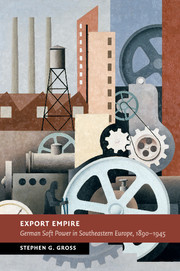Description
Export Empire
German Soft Power in Southeastern Europe, 1890–1945
New Studies in European History Series
Author: Gross Stephen G.
A major new interpretation of Nazi influence in southeastern Europe through the concepts of soft power and informal empire.
Language: English
Subject for Export Empire:
Approximative price 40.64 €
In Print (Delivery period: 14 days).
Add to cart
Export Empire
Publication date: 02-2018
Support: Print on demand
Publication date: 02-2018
Support: Print on demand
Approximative price 104.06 €
In Print (Delivery period: 14 days).
Add to cart
Export Empire
Publication date: 01-2016
398 p. · 15.8x23.5 cm · Hardback
Publication date: 01-2016
398 p. · 15.8x23.5 cm · Hardback
Description
/li>Contents
/li>Biography
/li>
German imperialism in Europe evokes images of military aggression and ethnic cleansing. Yet, even under the Third Reich, Germans deployed more subtle forms of influence that can be called soft power or informal imperialism. Stephen G. Gross examines how, between 1918 and 1941, German businessmen and academics turned their nation - an economic wreck after World War I - into the single largest trading partner with the Balkan states, their primary source for development aid and their diplomatic patron. Building on traditions from the 1890s and working through transnational trade fairs, chambers of commerce, educational exchange programmes and development projects, Germans collaborated with Croatians, Serbians and Romanians to create a continental bloc, and to exclude Jews from commerce. By gaining access to critical resources during a global depression, the proponents of soft power enabled Hitler to militarise the German economy and helped make the Third Reich's territorial conquests after 1939 economically possible.
Introduction: the foundations of soft power and informal empire; Part I. German Power in the Wilhelmine Empire and the Weimar Republic: 1. The legacy of Wilhelmine imperialism and the First World War, 1890–1920; 2. The economics of trade: building commercial networks in southeastern Europe, 1925–30; 3. The culture of trade: cultural diplomacy and area studies in southeastern Europe, 1925–30; 4. The politics of trade: Paneuropa, Mitteleuropa, and the Great Depression, 1929–33; Part II. Nazi Imperialism: 5. Stabilising the Reichsmark bloc: commercial networks in the Third Reich, 1933–9; 6. Economic pioneers or missionaries of the Third Reich? Cultural diplomacy in southeastern Europe, 1933–9; 7. Forging a hinterland: German development aid in the Balkans, 1934–40; 8. The Second World War: informal empire transformed, 1939–45; Conclusion: imperialism realised?
Stephen G. Gross is an assistant professor in the Department of History and the Center for European and Mediterranean Studies at New York University, and a former government economist at the Bureau of Economic Analysis, Washington DC. His research has been supported by the Fulbright Fellowship, the German Academic Exchange Service (DAAD), and the Berlin Program for Advanced German and European Studies. At New York University he teaches the history of capitalism, modern German history, the history of fascism, and theories of political economy, and he won an outstanding instructor award during his graduate studies at the University of California, Berkeley. His articles have appeared in numerous journals, including Central European History, Contemporary European History, German Politics and Society, and Eastern European Politics and Society.
© 2024 LAVOISIER S.A.S.




